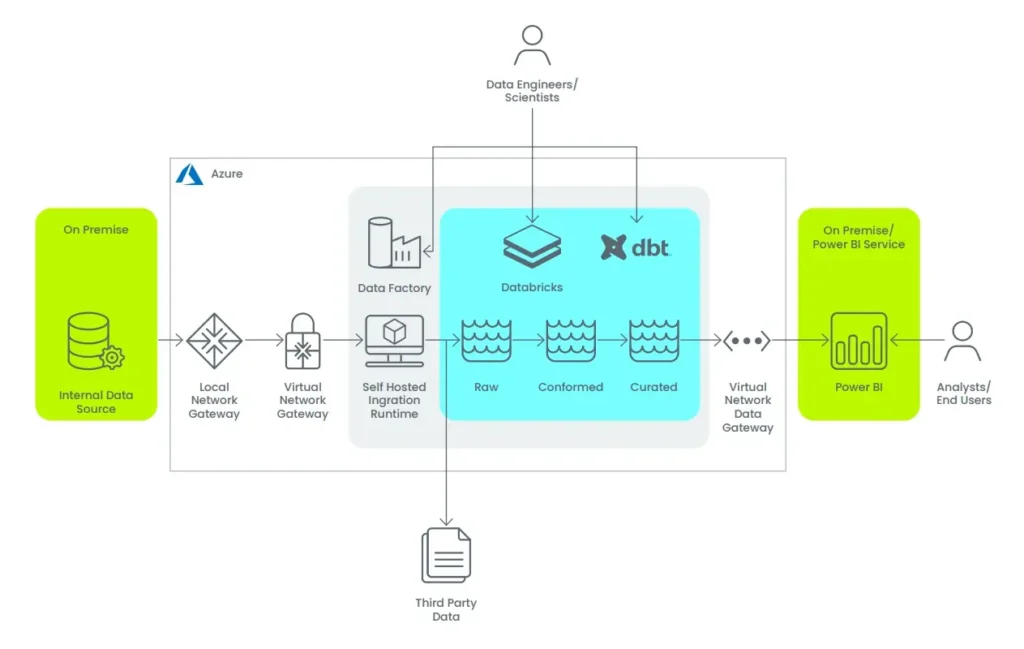Our client, a leading provider of IT solutions and services to businesses and the public sector, has grown to be one of the largest IT services firms in the UK, with an ambitious vision for the future.
In the past, growth was delivered through hiring in more sales staff to drive engagement with potential customers; however, at the scale they were approaching, it was recognised that a new approach was needed. The company was looking for help to build a data analytics platform to aid the sales staff in identifying new opportunities. As a sales first business, finding ways to improve the productivity of their sales force is key to driving better margins.
The company spoke to several data consultancies to help them find the right partner for the future., who could not only deliver on the technical capabilities, but who also could align with the culture of the business. Oakland was chosen for its data engineering and data governance expertise, focus on driving business value, and strong cultural fit.
What were the project goals?
Oakland were asked to build a data analytics platform that would extract, store and serve data to the sales team quickly and efficiently.
Historically, insights were often time-consuming to extract, and involved smashing together data from various websites and online databases into Excel spreadsheets. This had led to frustration that valuable sales time was being spent finding and accessing data rather than meeting new clients and delivering better solutions to existing clients.
The data analytics platform would therefore need to be able to extract data from multiple in-house and third-party sources and serve this data to the end user in a useful format to support the sales team with insights.
Once the data analytics platform was operational, a data science and machine learning model could be built, which showed the sales team a customer’s propensity to buy certain product categories and highlighted the likely products customers would buy. Visualisations also provide insight into product penetration and available spend, which would help sales staff quickly identify where to focus their time.
In addition to the platform, our client required help with creating a robust data governance framework and policies. Defining the data governance operating model and delivering a roll-out plan for data governance which could be easily implemented by the whole organisation.
Tailoring the solution
At Oakland, each data platform we design is built around the organisation’s unique business challenges and data landscape. We recognised early on that the platform was not a one-off solution, but something that would enable future analytics capabilities, so we set about architecting a solution that met the needs of today and was extensible enough to deliver future capabilities. Additionally, our client had a hybrid on premise and cloud infrastructure, so it was critical that we designed and built a networking and security infrastructure around the platform that would provide assurance on information security.
The Technical Components
A mile high view

Delivering an Analytics Platform on Microsoft Azure
One of the key goals of the project was creating a solution that our client could readily adopt built on their existing Microsoft tech stack. The in-house data team was well versed in Microsoft solutions, and they were heavily invested in Microsoft so it made complete sense to build the data platform using this technology. Microsoft Azure offered:
• Scalability: Azure allows you to scale resources up or down based on your needs, ensuring cost-efficiency and performance optimisation.
• Comprehensive Services: Azure provides a wide range of integrated services including databases, analytics, and machine learning, facilitating end-to-end data management and analysis.
• Security: Robust security features, including advanced threat protection and encryption, ensure your data remains secure and compliant with regulations.
• Integration: Seamless integration with existing Microsoft products and other third-party services enhances productivity and collaboration.
• AI and Machine Learning: Built-in AI and machine learning capabilities allow you to derive insights and drive innovation from your data.
Data Transformation – db
Dbt was chosen as the transformation tool as it allowed for models to be written in SQL, which aligned with the skill sets of the in-house data team.
Data Visualisation – Microsoft Power BI
PowerBI was already a leading provider of IT infrastructure’s data visualisation of choice, and offered row level security so a salesperson was only able to see their own account.
Compute – Databricks
Databricks was chosen as it integrates well with Microsoft Azure, and has strong enterprise security which met the clients strong security requirements. It can do business intelligence and machine learning work equally well which met the functional requirements of the data platform.
Data Orchestration/Extraction -Azure Data Factory
Chosen for its serverless low cost and strong security. Azure Data Factory is low code therefore easy to learn and able to integrate with all the data sources Microsoft SQL Server, and external web APIs.
A supported data governance journey
Oakland’s data governance approach focused on building out the pillars of data governance through a series of workshops. These were based on key pillars that had been identified by working together with key stakeholders to expand, define and document what was needed.
The next priority was undertaking data quality assessments by:
- Defining the data and its quality metrics and dimension
- Assessing in scope data against metrics and dimensions
- Creating a report on recommendations for improvement
- Creating a report on recommendations for improvement
- Reassessing the data against the defined metrics and dimensions once the recommendations had been implemented
How was the project delivered?
The project used Oakland’s tried and tested methodology which allows quick lighthouse wins that show incremental value.

Initiate Phase
- A cloud data platform architecture design
- A base analytics platform deployed in the cloud along with a development and test environment
- A repository of code to redeploy the environment
- Connection to the clients data warehouse
- Successful data extraction of subsetinto cloud analytics platform
- Further clarification of MVP requirements
Refine Phase
- Data source details alongside confirmed requirements and specifications for MVP solutions
- Data feeds from the data warehouse into a prepared reporting model / layer for reporting
- Customer propensity MVP: Data and reporting to support the sales team with insight and recommendations on existing customers to increase the sales penetration within these key accounts
Scale Phase
- Clear backlog and roadmap of further features to enhance customer propensity model
- Further scalability of technical solution around customer propensity; resolution of technical debt from previous phase
- Enhanced features for the customer propensity model in line with user feedback
- Scaled version of customer propensity model released to wider audience
- Data quality assessment of key enterprise customer data recommendations for improvements
- Updated quality assessment after improvements
What was the outcome?
The result was a complete data platform solution connecting to both in-house and third-party data sources, with a propensity model which identifies sales opportunities and serves the data into easy-to-follow PowerBI dashboards, all wrapped in a data governance framework.
The time the sales team would have previously wasted gathering data in spreadsheets aggregating and organising data to drive insights has now been significantly reduced.
The new data platform now takes this manual work off the sales teams’ hands and gives them a hugely valuable insight tool, which points them in the direction of the problems that they can help existing and new clients solve.
Using this data platform, account managers have been able to identify opportunities across multiple customers and vendors well past £10M, which has delivered a 150% return on investment after only 3 months of pilot user usage. The platform has also helped in the identification of renewals, vendor relationships with customers, and enabled the account managers to prioritise conversations based on objective data. The propensity tooling is being deployed to a wider audience, and seeing great uptake and usage, with expectations for further growth in the ROI of the platform.
Oakland continues to work with the client on further development of capabilities and use cases for the analytics platform, with a goal to further deploy tooling to better enable sales and marketing efforts.
“You’re brilliant – your people, the engagement, the way you understand your clients, our wants, wishes, culture. You’ve surpassed my expectations in the work you’ve done to date, the way you’ve done it and the pace and passion. Keep doing what you’re doing, and lots more of it! Thank you.”
Business Transformation Director
If you would like to talk about any elements of this case study, please drop us a line at hello@weareoakland.com

